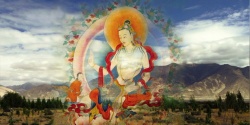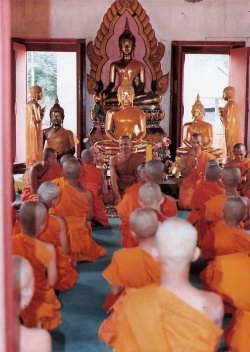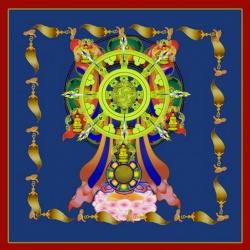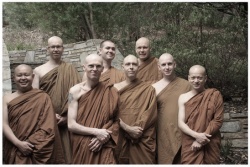Genuine Buddhism, A Short Bio
Then only will you see it, when you cannot speak of it: for the knowledge of it is deep silence, and suppression of all the senses.Hermes Trismegistus, Lib. X.5. To convey an adequate idea of early Buddhist doctrine presents almost insuperable difficulties. The Buddha already describes the Eternal Law (dhamma sanantana, akalika) which he had by no means excogitated by a process of ratiocination, but with which he identifies himself, and which had been taught by his predecessors in ages past as it would be taught by his successors in ages to come as a matter profound and difficult of comprehension by otherwise trained and other minded hearers; it is a doctrine for those whose wants are few, not for those whose wants are many. In his own lifetime the Buddha repeatedly found it necessary to correct the misinterpretations of his teaching to explain, for example, in what precise sense his was and was not a doctrine of "excision": was, in the sense of "cutting out" self love in reference to the corporeal and evil or that which is eternally sorrow in nature; and was not, in the sense of the annihilation of any reality. His was, indeed, a doctrine of Self naughting (neti-neti; not this not that) common to most all Indian philosophy, whoever would be free must have literally denied himself; for what remains, the terms of logic either or are inadequate; but it would be altogether inappropriate to say of the despirated Arahant, liberated by his super gnosis (nan’a), that "he neither knows nor sees" (D., III. 68).
If misunderstanding was possible in the Buddha's own time when, as he says, the Ancient Way that he reopens had been long neglected and a false doctrine had arisen, how much more is misinterpretation inevitable in our day of progress, self expression and the endless pursuits of higher materialistic standards of living? It has been almost completely forgotten, except by professional theologians, that an ultimate reality can be correctly described only by a series of negations of all that it is not. In any case, as Miss Horner remarked as recently as 1938, "the study of early Buddhism is admittedly still in its infancy" (Bk. of the Discipline, I, VI). If the reader thinks of Buddhism, quite rightly, as a way of "escape," he has still to ask himself from what, of what, and to what "there is in the world a way of escape" (S., 1. 128).
The difficulties have been intensified by the misinterpretations of Buddhism that are still to be found even in the works of narrow-minded western scholarship which is wholly devoid of the ancient Indian mind and metaphor. For example, one of the most notable scholars fails completely to distinguish the "becoming" of which the cessation coincides with the realization of immortality from the "making become" of our immortal part. Actually, "becoming" corresponds to what is now called "progress," regardless of the fact that change may be for better or for worse: and we are reminded that now, as then, "there are Gods and man who delight in becoming, and when they hear of putting a stop to becoming their minds do not respond" (Vism., 594). Another greatly regarded ‘scholar’ (among many) asserts that early Buddhism "denied a God, denied a Soul, denied Eternity," and it is almost universally claimed that the Buddha taught that there is no Self, thus ignoring that what is actually denied is the reality of the mutable corporeal/psycho-physical "individuality," and that what is said of the Self and of the Truth finder (or Thus come, the Tathatta’) and Perfect Man after death, is that none of the terms "becomes" or "does not become," "becomes and does not become," or "neither becomes nor does not become," apply to it or to Him who is without profane means of description by common explanation (S., IV. 384 f., 401 40=; Ud., 67, etc.). Again, it is still often asserted that Buddhism is a `'pessimistic" doctrine, notwithstanding that its goal of freedom from all the mental suffering that man is heir to is one attainable here and now: in any case, over looking that a doctrine can be judged only in terms of its truth or falsity, and not by whether we like it or not!
The Buddha is primarily concerned with the problem of evil (rupa) as suffering or pain (dukkha); the problem, that is to say, of the corruptibility of all things born and with discernable manifestation, composite and mutable, their liability to suffering, disease, inveteration, and death. That this liability a fact (The whole human race is so miserable and above all so blind that it is not conscious of its own miseries; Comenius, Labyrinth of the World and Paradise of the Heart, C. XXVIII). It was precisely because of this blindness that the Buddha hesitated to preach the Dhamma to the few men whose eyes are filled with very little dust.) that it has a cause, that its cause can be suppressed, and that there is a Way or Walk or Faring by which this cause can be suppressed these are the "Four Ariyan Truths" that are the beginning of wisdom. "Both now and heretofore I teach just this, ill and the end of the source of ill' (M., I. 140). Accordingly, Buddhism can be and often is reduced to the simple formulae of "contingent manifestation" (paticcasamuppdda): "this being so, that becomes; this not being so, that does not become." From the beginningless operation of mediate causes there is no escaping any of their composite effects; escape is possible only from the field in which the causal efficacy of past actions (kamma) operates, and only for that which was never an integral part of the field.
Buddhist doctrine is reducible to a statement of the law of causality because of the pertinence of this law to the problem of mutability and corruptibility; if the cause of misery can be suppressed there will be no further need to bother with its symptoms. In the cycle or vortex of becoming (bhava cakka, samsara) the instability, inveteration and death of whatever has had a beginning is inevitable; life or becoming is a function of sensibility, sensibility of wanting (tanha, thirst), and wanting a function of ignorance (avijja=moha, agnosis, delusion). Ignorance or agnosis, the ultimate origin of all suffering and bondage, all pathological states of subjection to pleasure and pain, is of the true nature of things "as become, or as they are" (yatha bhu’tam), and in particular of their inconstancy (aniccam). Every thing becomes, every thing flows like a river; there is no thing of which it can be said that it is (sabbe samkhara anicca). All that becomes is mortal; to have put a stop to becoming, no longer to be moved, is to be immortal. This intimately concerns ourselves; the most dangerous aspect of ignorance the "original sin " is that which leads us to believe that we "ourselves" are this or that and that we can survive from moment to moment, day to day or life to life as an identity.
Buddhism, then, knows of no "reincarnation" in the popular and animistic sense of the word: though many are "still under the delusion that Buddhism teaches the transmigration of souls in the animistic sense" (SBE, XXXVI, 142; Dialogues, II, 43). Just as for Plato, St. Augustine, and Meister Eckhart, so here, all change is a sequence of death and rebirth in continuity without identity, and there is no constant entity (satto) that can be thought of as passing over from one embodiment to another (Mil., 72) as a man might leave one house or village and enter another (Pv., IV. 3); rather the citta (consciousness) reanimates a new “individuality” starting with vinnana (sentience). Indeed, like that of "self," the very notion of an "entity as applied to anything existent is merely conventional (S., I. 135), and there is nothing of the sort to be found in the world (Mil., 268). That which perishes and again arises "not without otherness" is an individuality (nama rupu) (Mil., 98) or discriminating consciousness (vinnana) that inherits the former's "works" (M., I. 390; A., lII. 73). If the Buddha says that there are, assuredly, personal agents (attakara, Self-moving; A., Ill. 337 338), this does not, as Mrs. Rhys Davids supposed, "wipe out the doctrine of anatta altogether" (GS., III. xin). The Buddhist point of view is exactly the same as the Brahmanical: "I am not the doer of anything, it is the senses that move amongst their objects,' such is the view of the bridled man, a knower of the Suchness" (BG., V. 8 9, xviii. 1617). The individual is, indeed, responsible for and will inherit the consequences of his actions for so long as he thinks of "himself" as the agent; and no one is more reprehensible than the man who says "I am not the doer" while he is still actually involved in activity (Ud., 45; Dh., 306; So., 661), and argues that it does not matter what he does, be it good or evil (D., I. 53). But to think that I am or another is the doer, or that I or another will reap as I have sown is to miss the point (Ud., 70): there is no "I" that acts or inherits (S., ii. 252) ; or to speak more strictly, the question of the real existence of a personal agent is one that cannot be answered by a simple "Yes" or "No," but only according to the Middle Way, in terms of causal origination (S., 11. 19 20). But all these composite "entities" that originate causally are the very things that are repeatedly analyzed and found to be "not my Self" ; in this ultimate sense (paramatthikena) a man is not the agent. It is only when this has been realized and verified that a man can dare deny that his actions are his own; until then there are things he ought and things he ought not to do (Vin., I. 233; A., 1. 62; D., 1. 115). The identity philosophy of Buddhism is paralleled in that of Plotinus, which is seemingly so hard for the many to grasp.
There is nothing in the doctrine of causality (hetuvada) or in that of the causal effect of actions (kamma) that in any way necessarily implies a "reincarnation" of souls. The doctrine of causality is common to Buddhism and Christianity, and in both is effectively the statement of a belief in the orderly sequence of events. The "reincarnation" that the Buddhist would dispense with permanently is not a matter of any one eventful death and rebirth to be expected hereafter, but the whole vertiginous process of repeatedly dying and being born again that is equally the definition or temporal existence here as a "man" and of aeviternal existence there as a "God" (one amongst others). The accomplished Arahant knows better than to ask, "What was I in the past? What am I now? What shall I be hereafter?" (S., 11. 26 27). He can say "I" for everyday practical purposes without in any way intending what the notion of I or myself implies to an animist (D., I. 202; S., I. 14 15). Time implies motion, and motion change of place; in other words duration involves mutation, or becoming. Hence it is not immortality in time or any where, but apart from time and place, that the Buddhist envisages. Stated, in the pragmatic terms of everyday discourse, of which the application is only to things that have a beginning, development and, end (D., II. 63), it can be said of the Ego, "Once it was and then was not, once was not and then it was," but in terms of truth, "It was not, will not be, nor can it now be found; it neither is nor shall be `mine"'(Ud., 66; Th., I. 180). The Buddhist vortex or wheel of becoming is nothing but St James'; the Ego is an unreality for the Buddhist, just. as it had been for Plato and Plutarch, by the very fact of its mutability. The squirrel cage revolves, but "that's not me," and there is a way of escape from the round. The evil for which the Buddha sought a remedy is that of the wretchedness involved in the corruptibility of all things born, composite and inconstant. Misery, mutability, un Self ishness (In all traditional philosophies, in which it is axiomatic that "there are two in us;" it is unavoidable to distinguish "Self" from "self" or Ego, le moi from le soi, the savant from the connoisseur. In the present context Selflessness coincides with self ishness; to have said "unselfishness" would have been to say the opposite of what is meant, it is only of the Self that an ontological un selfishness, and therefore an ethical un selfishness can be predicated.
For the present we are discussing only the Ego, or self; the problem of the Self in Buddhism will be dealt with later (dukkha, anicca, anatta) are the characteristics of all composite things, all that is not my Self; and of all these things the Ego, I, self (aham, atta’) is the pertinent species, since it is with man's last end that we are concerned. It is axiomatic that all existences ("Existence," as distinguished from "being," esse from essentia.; S., II. 101, etc.) are maintained by food, solid and mental, as fire is fed by fuel ; and in this sense the world is on fire and we are on fire. The fires of the Ego consciousness, or self ishness, are those of appetite (raga=kama, tanha, lobha), resentment or irascibility (doss=kadha), and delusion or ignorance (moha =avijja). These fires can only be quenched by their opposites (A., IV. 445; Dh., 5. 223), by the practice of corresponding virtues and the acquisition of knowledge/gnosis (vijja), or, in other words, only cease to "draw," and so go out, or rather in, when their fuel is withheld. It is this "going out" that is called a "despiration/purification" (nibbana, Skr. nirvana), and is naturally linked with the notion of a "cooling off" (compare the vernacular, Why so hot, my little man?). Nirvana to use the word in its more familiar form is a Buddhist key word, than which is, perhaps, no other has been so much misunderstood (Extinction" (as of a fire) is not illegitimate; but "annihilation" is misleading. In India, the "going out" of a fire is always thought of as a "going home."). Nirvana is a death of becoming (bhava nirodha nibbanam; “Nirvana is the subjugation of becoming [always other and other]”), a being finished (both is the meaning of "ended" and of "perfected"). Nirvana is neither a place nor an effect, nor in time, nor attainable by any means; it is a process alone, but it is and it can be "seen." The "means" that are actually resorted to are not in themselves means to Nirvana (purification), but means to the removal of all that obscures the "vision" of Nirvana: as when a lamp is brought into a dark room one sees what is already there. Nirvana is spoken of as the path, not its ends but rather its means; in the absolute sense Nirvana is crossing to the other shore of refuge (saranamattano; refuge in the Self), but is not confused with the other shore except in much later erroneous Chinese doctrine which hold Nirvana to be literally the other shore of salvation.
We can now understand why the Self (atta’) must be tamed, conquered, curbed, and given its quietus. The Arahant or Perfect Man is one whose Self has been tamed (atta’ danto), whose Self has been cast off (atta’jaho); his burden has been laid down (ohita bltkro), what there was to be done has been done (katamkaraaiyam). All of the epithets that are applied to the Buddha himself, who has no longer a personal name (Even "Gotama" is not a personal, but only a family name; Ananda, too is a Gotamid) are applicable to him; he is "released" (vimutto), he is "despirated/purified" (nibbuto), there is no more becoming for him, he has earned his rest from labor in yoking to security (yoga kkhemam), he is awake (buddho, an epithet applicable to any Arahant, not only to the Buddha; synonymous With Suddha, or Pure), he is immovable (anejo), he is an "Ariyan," no longer a disciple (sekho) but a Master (asekho), and fixed in the Self/Soul as ultimate (Theragatha Att. 1.51 parinibbuto t.hitattoti “Parinirvana is to be fixed in the Soul”), Atta’sarana anan’n’asarana."Soul as a refuge with none other as refuge” DN 2.100.
Selfishness (mamattam, "possessiveness"; maccheram, "bad behavior," "law of the sharks") is a moral evil, and therefore the taming of the self requires a unific-moral discipline. But selfishness is supported by "Self ishness" (asmi mana, anattani atta ditthi), and mere commandments will hardly suffice unless and until the erroneous view that "this is me (corporeal)" has been shattered. For the self is always self assertive, and it is only when the true nature of the inconstant self has been realized that a man will set out in earnest to overcome his own worst enemy and make him a servant and ally. The first step is to acknowledge the predicament, the second to unmask the self whose sole liability it is, the third to act accordingly; but this is not easy, and a man is not very willing to mortify himself until he has known these appetitive congeries for what they are, and until he has learnt to distinguish his Self and its true interest from the mirror-image deemed falsely as Self, his self and its interests. The primary source of evil is ignorance/agnosis, and it is, in fact, by the truth that the self must be tamed (S., I. 169). Only "The truth shall make you free!" The remedy for self love (atta ka’ma) is Self love (attakama) and it is precisely in this sense, in the words of St Thomas Aquinas, that "a man, out of charity, ought to love himself more than any other person, more than his neighbor” (Sum. Theol., II. ii. 26.4). In Buddhist terms "let no man worsen welfare of himself for other's weal however great; if welt he knows the Self's true interest, let him pursue that end" (Dh., 166). In other words, man's first duty is to work out his own salvation, from himself.
The procedure, in often repeated expositions of the "un Self ishness" (anatta) of all phenomena, is analytical. The repudiation is of what would nowadays be described as "animism": the psycho physical, behaving mechanism is not a "Self," and is devoid (sun’n’a) of any Self like property. The “individuality” or self consciousness or self existence (atta sambhava) is a composite of five associated grounds (dhatu) or stems (khandha), viz., the visible body (rupa, kaya), and invisible sensation (vedana, pleasant, unpleasant or neutral), recognition, or awareness (sanna), constructions or character (samkhara; here with reference to mental images, experiences, phantasms, notions, postulates, complexes, opinions, prejudices, convictions, ideologies, etc. In a more general sense samkhara defines all things that can be referred to by name or sensibly perceived, all nama rupa, all "things," ourselves included) and discrimination, discretion, judgment, or valuation (vinnana; 'The five khandhas are nearly the same as the five "powers of the soul" as defined by Aristotle (De an., 11, 111) and St Th. Aquinas (Sum. Theol., 1, 18. 1), viz. the vegetative (nutritive), sensitive, appetitive, motive, intellectual [diagnostic, critical]),' in short, a composite of body and discriminating consciousness/sentience (sa vinnana kaya), the psycho physical existent. The causal origination, variability, and mortality of all these factors is demonstrated; they are not "ours," because we cannot say "let them, or let me, be thus or thus" (S., 111. 66 67): on the contrary, "we" are what they "become," "a biological entity, impelled by inherited impulses (L. Paul, The Annihilation of Man, 1945, p. 156.) The demonstration always concludes with the words: "That's not mine, I'm not that, that's not my Self/Soul." To have done with them for good and all, to put away the notions "I am So and so," "I am the agent," "I am," will prove to be "for your advantage and your happiness" (S., III. 34). The Buddha, or any Arahant is a "No-body"; one cannot properly ask his name, for is is that he is, suchness, thatness, the unnamed proclamation, i.e. Tathatta’. Otherwise stated, any thing or individuality is characterized by "name and shape" (nama rupa), Aristotle, Met., VIII. 1.6); "name" referring to all the invisible, and "shape" or "body" (rupa being interchangeable with kaya) to all the visible and sensible constituents of individuality. This is as much as to say that "time and space" are the primary forms of our understanding of things that become; for while the shape or body of anything is evanescent, its name survives, and by its name we still hold on to it. It is by his "names," those of the "Law" and "Truth," that the Wake survives in the world, although, like the rivers when they reach the Sea, his liberation is from name and shape, and whoever has "gone home" is no longer in any category, no longer this or that, or here or there (Sn., 1074).
All this is nothing peculiarly Buddhist, but the burden of a worldwide philosophy, for which salvation is essentially from ones-Self. Denegat seipsum ! Si quis . . . non odit animam suam, non potest meus dtscipulus esse! "The soul is the greatest of your enemies. "(AI Ghazali,Al Risalatal Laduniyya, ch. II.) "Were it not for the shackle, who would say `I am I’?"( Rumi, Mathnawi, I. 2449.) "Self is the root, the tree, and branches of all the evils of our fallen state" (W. Law, Hobhouse, p. 219.); "it is impossible to lay hold twice of the essence of anything moral . . . at one and the same moment it arrives and is dissolved" (Timaeus, 28 A, cf. Cratylus, 440: Plutarch, Moralia, 92 B. For the Buddhist doctrine of the "moment" (khana) in which things originate, mature, and cease, cf. Vis., I, 239, and the fuller development in the Mahayana.) such citations could be multiplied indefinitely. It is less often realized that many modern naturalists and psychologists have reached the same conclusions. "The naturalist maintains that the states and events called mental exist only when certain organizations of physical things also occur…[and] are not exhibited by those things unless they are so organized…The structured object is simply manifesting the behavior of its constituents…[it] is not an additional thing which . . .controls…the behavior of its organized parts." The naturalist's and the Buddhist interpretation of the behavior of the "structured object" are so far identical= but whereas the former identifies himself with the behaving object (Such an identification reverts to the animistic proposition, "I think, therefore I am," and involves the unintelligible concept of a single agent that can will opposite things at one and the same time. The logical positivist ought to deny the possibility of any "self control," perhaps he does) the Buddhist insists that there is no object that can properly be called "my Self", for it is not object nor objectified; unfortunately leading many to the erroneous conclusion that Buddhism negates Self/Soul. The psychologists, on the other hand, prescinding from the Ego, still, like the Buddhist, leave room for something other than the Ego and that can experience an "infinite happiness." "When we see that all is fluid . . . it will appear that individuality and falsity are one and the same," the direct implication being, as in the anatta doctrine, that "we" are other than our individuality. "In the traditionally use customarily” emphasized individuality of each one of us, `myself'…we have the very mother of illusions… [and] the tragedy of this delusion of individuality is that it leads to isolation, fear, paranoid suspicion, and wholly unnecessary hatreds;" "any person would be infinitely happier if he could accept the loss of his `individual self'," as the Buddha puts it, he does not worry about what is unreal. "In the epoch of scientific rationalism; what was the psyche? It had become synonymous with consciousness…there was no psyche outside the ego…When the fate of Europe carried it into a four years' war of stupendous horror…no one realized that European man was possessed by something that robbed him of his free choice;" but over and above this Ego there is Self "around which it revolves, very much as the earth rotates about the sun," although "in this relation there is nothing knowable in the intellectual sense, because we can say nothing of the contents of the Self." (The naturalists and psychologists cited are Dewey, Hook and Nagel, Charles Peirce, H.S. Sullivan, E.E. Hadley, and C.G. Jung. It will be seen that the latter, who speaks of the "absolute necessity of a step beyond science," is a metaphysician in spite of himself. The citations are not made by way of proving the truth of the Buddhist analysis, but to help the reader to understand it; the proof of the pudding will be in the eating. (The italics are mine).)
What has Buddhism to say of the Self? "That's not my Self" (na me so atta); this, and the term "non Self ishness" (anatta) predicated of the world and all "things" (sabbe dhamma anatta; Identical with the Brahmanical "of those who are mortal, there is no Self", (anatma hi martyah, SB., II. 2. 2. 3). KN Jatakapali 1441 Akkhakandam: “Atta’ ca me so saranam gati ca” “The Soul is the refuge that I have gone unto”. For anatta is not said of the Self/Soul but what it is not. There is never a ‘doctrine of no-Soul’, but a doctrine of what the Soul is not (form is anatta, feelings are anatta, etc.).
They have formed the basis of the mistaken view that Buddhism "denies [not merely the self but also] the Self." But a moment's consideration of the logic of the words will show that they assume the reality of a Self that is not any one or all of the "things" that are denied of it. As St Thomas Aquinas says, "primary and simple things are defined by negations; as, for instance, a point is defined as that which has no parts;" and Dante remarks that there are "certain things which our intellect cannot behold…we cannot understand what they are except by denying things of them." This was the position of the older Indian philosophy in which Buddhism originated: whatever can be said of the Self is "Not so." To acknowledge "nothing true can be said of God" is certainly not to deny his essence! For it is that: “Atta hi attano natha, atta hi attano gati” KN 2.380:"Soul is the support of the Soul, the Soul returns to the Soul”; KN 2.160:"Atta hi attano natho, ko hi natho paro siya?", Soul is the support of the Soul. What else could it be?
When the question is pressed, Is there a Self, the Buddha refuses to answer "Yes" or "No”; to say "Yes" would involve the "consubstantialist" error, to say "No" the "anti-foundationalist" error (S., IV. 400 401; “If, on the one hand Ananda, when I was asked by Vacchagotta the wanderer ‘how is Soul’, I had responded: ‘this is the Soul’, then so I would have been aligning fully with resurrectionist Brahmins and ascetics. And if, when I was asked by Vacchagotta the wanderer ‘how is there no Soul’, I had responded: ‘there is no Soul’, then so I would have been aligning fully with anti-foundationalist Brahmins and ascetics.) And similarly, when the postmortem destiny of a Buddha, Arahant, or Very Man arises, he says that none of the terms "becomes" (hoti) or "does not become" or "neither becomes nor does not become" or "both becomes and does not become" apply. Any one of these propositions would involve an identification of the Buddha with some or all of the five factors of personality; all becoming implies modality, but a Buddha is not in any mode. It should be emphasized that the question is always asked in terms of becoming, not in terms of being. The logic of language only applies to phenomenal things (D., II. 63), and the Arahant is uncontaminated by any of these "things": there are no word ways for one whose self is no more; one "gone home" is no longer in any category (Sn., 1074, 1076). Nevertheless it is also said that the Buddha "is (atthi), though he cannot be seen "here or there," and denied that an Arahant "is not" after death. If, indeed, absolutely nothing remains when the self is no more, we could not but ask, Of what is an immortality predicated? Any reduction of a reality to the nothingness of "the son of a barren woman" would be meaningless and unintelligible; and, in fact, the Buddha in repudiating the "annihilationist" doctrines that were attributed to him by some contemporary heretics expressly denies that he ever taught the destruction of anything real (sato sattassa) (M., I. 137, 140). There is, he says, "an unborn, un become, unmade (akatam; The "unmade world" (Brahmaloka) of the Upanishads), incomposite (asamkhatam; Incomposite;' i.e. without origination, growth or mutation, A., I. 152; Nirvana, Mil., 270 ; Dhamma, S , IV, 359. On the other hand, even the highest Contemplative "states" are composite, and it is even from these exalted conditions that there is a "final escape".), and were there not, there would be no escape from the born, the become, the made and the composite (world)" (Ud., 80): "knower of what was never made (akatannu) art thou, O Brahman, having known the waning away of all composite things."
The Buddha expressly "holds nothing back," making no distinction of a within from a without, his is "not a closed fist" (D., II. 100); but the Eternal Law, and Nirvana, and namely the Self are "incomposite," and for this transcendent Worth (param'attha) all words are inadequate all alta fantasia qui manco possa (Paradiso, XXXIII. 142) in which the disciple must have Faith (saddha) until he can contact it, until Faith is replaced by Knowledge/gnosis; "he whose mind has been fired by the desire of the Untold (anakkhata), he is one freed from all loves, a swimmer against the current" (Dh.. 218), "the Buddhas do but tell the Way" (Dh., 276). If there is a salvation by faith (Sn., 1146), it is because "Faith is most conducive to knowledge" (S., IV. 298): Crede ut intelligas. Faith implies authority: and the Buddha's authority (mahapadesa), which rests upon his own immediate experience, is that of his words as spoken or as reported by competent Mendicants; in the latter case not merely rightly grasped, but checked for their consistency with the texts of the Canon and the Rule. In this initial dependence in what has not yet been "seen" there is nothing uniquely Buddhist or credulous. The Buddha's doctrine is always about what he claims to have personally seen and verified, and what he tells his disciples can be seen and verified by them if they will follow him in Brahma faring. "The Buddhas do but tell the Way, it is for you to swelter at the task" (Dh., 276); the "End remains untold" (Sn., 1074); it has no sign (S., 1. 188; Sn., 342), and is a gnosis that cannot be communicated (A., III, 444); and those whose reliance is only on what can be told are still under the yoke of death (S., I. II).
In the discussion of Faith it is too often overlooked that the greater part of our knowledge of "things," even of those by which our worldly actions are regulated, is "authoritative"; most, indeed, even of our daily activities would come to an end if we did not believe the words of those who have seen what we have not yet seen, but might see if we would do what they have done, or go where they have been; in the same way those of the Buddhist neophyte would come to an end if he did not "believe" in a goal not yet attained. Actually, he believes that the Buddha is telling him the truth, and acts accordingly (D., II. 93). Only the Perfect Man is "faithless," in the sense that in his case knowledge of the Unmade has taken the place of Faith (Dh., 97), for which there is no more need.
For the Buddhist, Dhamma, the Lex Aeterna (A Law above our minds, which is called the Truth," St Augustine, De ver. relig. XXX, cf. St Thomas Aquinas, Sum, Theol„ It. i, 91. 2.) synonymous with the Truth (S., 1. 169), is the ultimate authority and "King of kings" (A., I. 109, Ill. 149). It is with this ultimate, timeless and temporal, transcendent and immanent authority that the Buddha identifies himself, that Self in which he has taken refuge: "he who sees the Dhamma sees me, and he who sees me sees the Dhamma" (S., III. 120; It., 91 ; Mil., 73). One of the most impressive of the Buddhist books is called the Dhammapada, "Footprints of the Law"; it is a chart and guide book for those who "walk in the Way of the Law" (dhamtnacariyam caranti), which is also the "Way of Brahma" or "Brahma faring" (brahmacariyam), and "that old road that was followed by the formerly All awakened." The Buddhist words for "Way" (magga) and for "seeking" (gavesana; cf, the story of Gavesin, p. 41.) a with the Self as object (Vin., I. 23; Vis., 393), bout imply the following of tracks or footprints (As in Plato, passim. Meister Eckhart's "soul following the spoor of her quarry, Christ.") But these tracks end when the shore of the Great Sea is reached; until then the Mendicant is a disciple (sekho), thereafter an expert (asekho), "no longer under a pedagogue" (Gal., 111. 25). The Way prescribed is one of self naughting, virtue and contemplation, walking alone with Brahma; but when the end of the "long road" has been reached, whether here or hereafter, there remains only the "plunge" into the Immortal, into Nirvana (amatogadham, nibbdn'ogadham), into that fathomless Ocean that is an image at once of Nirvana, Dhamma, and the Buddha himself (M., I. 488; S., IV. 179, 180, 376, V, 47; Mil., 319, 346). This is an old simile, common to the Upanishads and Buddhism: when the rivers reach the Sea, their name and shape is lost, and one only speaks of "the Sea." This last end is already prefigured in the adoption of the monastic vocation; like the rivers when they reach the Sea, so men of whatever caste becoming Mendicants are no longer called by their former names or lineage, but are simply of the lineage of those who have sought and found the Truth (Vin., II. 239; A., IV. 202; Ud., 55).
"The dewdrop slips into the shining sea." Yes, but this is not an exclusively Buddhist formula; we find it in Rumi (Attham gato is a good example of the numerous etymological ambiguities that are met with in Pali, Where attham=Skr. astam, the sense is that of "gone home," but where attham=artham, that of "having attained one's purpose, or goal." Such an ambiguity is far from inconvenient, since the "return home" and the "attainment of the end" have a common reference); (Nicholson, Diwan, XII. XV; Mathnawi, passim), in Dante (sua voluntate . . . e quel mare tutto si more [Paradiso, ILI. 84]), in Meister Eckhart (also sieh wandelte der tropfe in daz mer "the sea of God's unfathomable nature . . . plunge in, this is the drowning"), Angelus Silesius (Wenn du das Trapffein wist im grossen Meere nennen, Den wist du meme SeeP inn grossen Gott erkennen [Cher. Wandersmann, II. 25]) and in China, where the Tao is the ocean to which all things return (Tao to Ching xxxii). Of all those who reach it can only be said that their life is hidden, enigmatic. The Buddha visibly present in the flesh is even now "unattainable" (anupalabhyamano) and "past finding out" (ananuvejjo); no one thus "gone home" can be referred to any category (sankham na upeti [Sn., 1074]). For "no one who sees me in any shape sees me"; "name and aspect are none of mine"; he only who sees the Eternal Law sees the Buddha, and that as effectively to day as when he still wore the personality (persona "mask," "disguise") that at death "he burst like a coat of mail" (A., IV. 312).
The equation between Dante's mare with the Buddhist "Sea," implied above, many seem to import a theistic sense into the supposedly "atheistic" Buddhist doctrines; but it need only be pointed out that no real distinction can be drawn between the immutable Will of God and the Lex Aeterna, his Justice of Wisdom, that Nature which is also his Essence and to act against which would be to deny himself. The Law, Dhamma, had always been a nomen Dei, and is still in Buddhism synonymous with Brahma. If the Buddha identifies himself with the Eternal Law, this means that he cannot Fin; he is no longer `'under the Law", but being himself the Law can only act accordingly, and we find amongst the interpretations of the epithet "Thus come" or "Truth finder" that "as he says, so he does." But for those who are still Wayfarers and learners, sin (adhamma) is precisely an offence against that Natural Law which represents the share of the Eternal Law that determines the individual's responsibilities and functions. In other words, the Eternal Law has its immanent correlative in every man's "own law" (sa dhamma [Sit., 1020]), by which his natural inclinations and proper functions (attano kamma) are determined ; and it is only greed or ambition that leads to the disparagement of the nativity by which a man is normally "protected" (Sn., 314, 315). I mention this only because of currency of the erroneous opinion that the Buddha "attacked" the caste system. What he actually did was to distinguish the Brahman by mere birth from the true Brahman by gnosis, and to point out that the religious vocation is open to a man of any birth (A., III. 214 ; S., I. 167) : there was nothing new in that. Caste is a social institution, and the Buddha was speaking mainly for those whose preoccupations are no longer social; for the householder it is observed that, his entelechy consists in the perfection of his work (A., 111. 363), and only those occupations that injure others are condemned. The duties of a Ruler are often enumerated. The Buddha himself was a Royalty inasmuch as he laid down a Law, and was a Brahman by character (Mil., 225 227). Brahmans are only disparaged in so far as they do not live up to their ancient norm. In many contexts "Brahman" is synonymous with "Arahant."
It has been asserted that Buddhism knows only of the personal God Brahma’ and nothing of the Godhead Brahma: this would have been strange indeed in India of the fifth century BC, in one who had studied under Brahman masters, and in scriptural contexts that are so often reminiscent of the Brahmanas and Upanishads. Actually, there can be no doubt that in the grammatically ambiguous expression brahma bhu’to which describes the condition of those who are wholly liberated, it is Brahma and not Brahma’ that must be read; it is Brahma that one who is "wholly awake" has "become." For (1) the comparatively limited knowledge of a Brahma’ is repeatedly emphasized, (2) Brahma’s are, accordingly, the Buddha's pupils, not he theirs S., I. 141 145; Mil., 75 76), (3) the Buddha had already been, in previous births, a Brahma’ and Maha’ Brahma’ (A., IV. 88 90), hence it would be meaningless, in the equation brahma bhu’to=buddho (A., V. 226 ; D., Ill. 84 ; It., 57, etc.), thereby assuming that brahma (neuter)=Brahma’, and (4) the Buddha is explicitly "much more than a Maha’ Brahma’ (DhA., II. 60). It is true that the Buddha is often addressed by Brahmans as Brahma’ (Sn., 293, 479, 508), but here Brahma is not the name of the God, but (as in Skr.) the designation of a true and learned Brahman (in Vedic ritual, the Brahma is the most learned of the four Brahman officiants, and their standard in all matters or doubt; hence Brahma, as from one Brahman to another, is the most respectful possible form of address.) and tantamount to Arahant (Sit., 518, 519). As for the "Gods" (deva), e.g. Indras, Brahmas and many other and lesser divinities or angels, not only are these at least as real as men, not only do the Buddha himself and other Arahants visit their worlds and converse with them, and not only is the Buddha the "teacher of Gods and men" (S., III. 86), but in response to questions he explicitly ridicules the notion that "there is no other world" (as maintained by the "Nothing morists," whom we should now call Positivists [M., I. 403]) and the preposterous view that "there are no Gods" (M., IL 212). Finally, inasmuch as the same things are said of the Self and of the Buddha, e.g. that definitions of either in terms of either or are invalid, not only is "Buddha" explained as "one whose Self is awake (Buddh'atta buddho, his., 209, cf, BU., IV. 4. 13 pratibuddho atma. The "awakened Self" will be the "Self made become" (bha’vit' atta’, passim), i e. the "unborn Self (ajata'atta) that neither ages nor dies," DhA., 1. 228, cf. BG., 11. 20); (Vis., 209 : cf. BU., IV. 4.13), but there can hardly be any doubt that the commentator is right in asserting that in such contexts the Truth finder or Thus come "is the Self" (Ud.. 67 with UdA., 340). That the Buddha is not only a transcendent principle Eternal Law and Truth but also universally immanent as the "Man in this than" is implied by the epithet "All within" (Vessantara=Visvantara [M., I. 386; It., 321' applied to him, and by the words, "Whoever would nurse me; let him nurse the sick" (Vin., I. 302), this last a striking parallel to Christ's "inasmuch as ye have done it unto one of the least of these my brethren ye have done it unto me."
In the whole of the Buddhist canonical literature it is nowhere stated that "there is no Self," no reality distinguishable from the empirical self that is repeatedly subjected to destructive analysis. On the contrary, the Self is both explicitly and implicitly asserted; notably in the recurrent phrase according to which this, that or the other "is not my Self." We cannot ignore the axiom, Nil agil in seipsuin: Plato's "when there are two opposite impulses in a man at the same time about the same thing, we say that there must be two in, him" (Rep., 604B). This will apply, for example, when the conditions, are described in which Self is the friend or the foe of self (S., I. 57,71 72 as in (BG., VI. 5 7), and whenever a relation between two selves is asserted. The Buddhist is expected to "honor what is more than self" (A., I. 126), and this "more" can only be the "Self that's Lord of self, and the goal of self" (Dh., 380). It is of the Self and certainly not of himself that the Buddha is speaking when he says "I have taken refuge in the Self" (D., 2.120), and similarly when he asks others to "seek for the Self" (Vin., 1. 23; Vis., 393), and to "make the Self your refuge and your lamp" (D., II. 100; S., V. 163; cf. S., III. 143). Distinction is also made of the "Great Self" (mah'atta’, "Mahatma," "the magnanimous") from the "little self" (app'atumo, "the pusillanimous"), and of the "Fair Self" from the "Foul self," the former blaming the latter when wrong is done (A., I. 57, 149, V. 88). In short, it is quite certain that the Buddha neither "denied a God, denied a Soul, [nor] denied Eternity."
In numerous contexts, the Buddha and other Arahants or Perfect Men are described as "having made the Self become" (bha’vit'atto); "made become," i.e. "as a mother fosters her only son," for this causative form of the verb "become" (the want of which in English is a serious inconvenience) means to "foster," "care for," "cultivate," "serve" or "provide for". This "making become" of the Self is an indispensable part of the Buddhist pilgrim's progress, and certainly no less so than is the corresponding negative task of putting a stop to all "becoming." To have completed either task is to have completed the other, and to have reached the goal: and "so," as Wordsworth says, "build we up the being that we are." But the modern scholar must be careful to distinguish the "becoming" that is a mere metabolism, an undirected process of automatic growth or "progress," from the "making become" that is a selective cultivation. It is only the empirical self, composite of body and consciousness (vinnana) that "becomes." Apart from the bodily constitution, consciousness cannot arise; our "former habitations," i.e. past lives, are composites of this sort, but "not mine," "not my Self" (S., III. 86); and of the Mendicant in whom the conditions that lead to the renewed becoming of a consciousness have been suppressed it is said that he is one whose Self is liberated, existent, altogether content, and that he knows that for him there is no mare birth, no more becoming (S., III. 55). It is very implicit in Sutta that the disciple is to become the more of That, his Self, his Soul, not to make it wane or fall away. Thou art That, namely in having made become that which is fixation for Supreme Ones, Tathagatas.
Merely to have reached the Brahma’ worlds or to have become a Brahma’ there is not the last end; to have become a Brahma’, or even the Maha’ Brahma’ of the aeon, is indeed a tremendous achievement, but it is not the same as to have become Brahma, or totally despirated Buddha and Arahant. The distinction of Brahma’ from Brahma, expressed in Christian terms, is that of God from Godhead, and it will help to make the matter clearer in the Buddhist contexts if I quote analogous statements from two of the greatest and most intellectual of the Christian "mystics":
"You must," says Meister Eckhart, "learn what God and Godhead are. God works, the Godhead does no work. God becomes and unbecomes (wirt and entwirt), and is an image of all becoming (werdenne); but the Father's nature does not become (unwerdentlich ist), and the Son is one with Him in this unbecoming (entwerdenne). The temporal becoming ends in the eternal un becoming" (Pfeiffer, 516 and 497). So "it is more necessary that the soul lose God than that she losecreatures" (Evans, I. 274), if she is to reach that state in which we shall be "as free as when we were not, free as the Godhead in its non existence." "Why do they not speak about the Godhead? Because all that is there is one and the same, and there is nothing to be said . . . When I go back into the ground, into the depths, into the well spring of the Godhead, no one will ask me whence I came or whither I went" (Pfeiffer, 180 181). "Our essence is not annihilated there, for although we shall have there neither cognizance, nor love, nor beatitude, but there it becomes like unto a desert in which God alone reigns."( [[Meister Eckhart's "non existence," "well spring;' "desert" correspond to the Buddhist Sea (as discussed above) in which all differentiation is lost (cf. Nicolas of Cusa's definition of theosis as ablatlo omnis alteritatis et diversitatis) and to Rumi s "Sea" of Love or Non existence, the lover becoming there the Beloved (Matbnawi, 1. 504, 1109; 11. 688 690, 1103; 111. 4723; Vl. 2771 et passim, with Nicholson's notes).]] ) Accordingly, the unknown author of The Book of Privy Counseling and The Cloud of Unknowing makes a difference between those who are called to salvation and those who are called to perfection, and citing Mary's choice of "that best part, the which shall not be taken away from her" (Book of Privy Counseling, f. 105 a), remarks of the contemplative life that "if it begin here, it shall last without end," adding that in that other life "there shall be no need to use works of mercy, nor to weep for our wretchedness" (Cloud of Unknowing, ch. 21).
Parallels such as these are sometimes even more conducive to an understanding of the content of Buddhism than are the direct citations from the Buddhist canon; for they enable the reader to proceed from a known to lesser known phraseology. It need hardly be said that for a European reader or scholar who proposes to study any Oriental religion seriously a considerable knowledge of Christian doctrine and thinking, and of its Greek background, is almost indispensable. The two selves are in dramatic contrast whenever one reproaches the other. "Self upbraids the self (atta pi atta’nam upavadati) when what should not be done is done (A., I. 57 58): for example, when the Bodhisatta begs his food for the first time, he cannot stomach the unappetizing scraps he receives, but "he blames himself," and he does not allow himself to weaken (J., 1. 66). The Self knows what is truth and what is falsity, and the Foul self cannot hide its evil deed from the Fair (A., 1. 149). The Self is, then, our conscience, inwit and synteresis; the Socratic Daimon "who cares for nothing but the Truth" and "always holds me back from what I want to do." It is a matter of universal experience that, as Plato says, "there is a something in the soul that bids men drink, and a something that forbids, that hungers and thirsts, and another one that keeps account," and it is for us to decide "which shall rule, the better or the worse." Self is the Agathos Daimon, whom it is for "me" to obey. This leads us to consider the doctrine of the "Daimon's purity" (yakkhassa suddhi). Ignoring that there can be a multiplicity of Genii, just as in other traditions there can be a multiplicity of "spirits other than the Spirit," it must be premised that the Daimon (yaksa) had been originally and was still for the Upanishads, Brahma that Brahma, who is at once transcendent and, as the "Self of the self," immanent.











